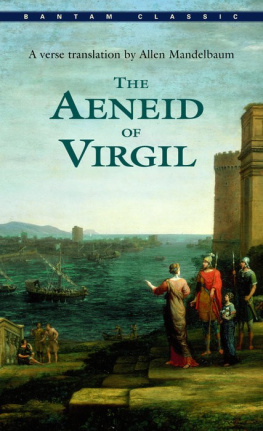Selections from Virgil Aeneid XI
The following titles are available from Bloomsbury
Selections from Apuleius Metamorphoses V: An Edition for Intermediate Students, with introduction, commentary notes and vocabulary by Stuart R. Thomson
Selections from Cicero Philippic II: An Edition for Intermediate Students, with introduction, commentary notes and vocabulary by Christopher Tanfield
Selections from Cicero Pro Milone: An Edition for Intermediate Students, with introduction by Lynn Fotheringham and commentary notes and vocabulary by Robert West
Selections from Horace Odes: An Edition for Intermediate Students, with introduction, commentary notes and vocabulary by John Godwin
Selections from Horace Satires: An Edition for Intermediate Students, with introduction, commentary notes and vocabulary by John Godwin
Selections from Ovid Amores II: An Edition for Intermediate Students, with introduction, commentary notes and vocabulary by Alfred Artley
Selections from Ovid Heroides: An Edition for Intermediate Students, with introduction, commentary notes and vocabulary by John Godwin
Selections from Propertius, Tibullus and Ovid: An Edition for Intermediate Students, with introduction, commentary notes and vocabulary by Anita Nikkanen
Selections from Tacitus Annals I: An Edition for Intermediate Students, with introduction by Roland Mayer and commentary notes and vocabulary by Katharine Radice
Selections from Tacitus Histories I: An Edition for Intermediate Students, with introduction by Ellen OGorman and commentary notes and vocabulary by Benedict Gravell
Selections from Virgil Aeneid VIII: An Edition for Intermediate Students, with introduction, commentary notes and vocabulary by Keith Maclennan
Selections from Virgil Aeneid X: An Edition for Intermediate Students, with introduction, commentary notes and vocabulary by Christopher Tanfield
Selections from Virgil Aeneid XI: An Edition for Intermediate Students, with introduction, commentary notes and vocabulary by Ashley Carter
Supplementary resources for these volumes can be found at www.bloomsbury.com/bloomsbury-classical-languages
Please type the URL into your web browser and follow the instructions to access the Companion Website. If you experience any problems, please contact Bloomsbury at contact@bloomsbury.com
Contents
Preface
The text and notes found in this volume are designed to guide any student who has mastered Latin at beginners level and wishes to read a selection of Virgils Aeneid XI in the original.
The text used is that of Williams (1973), suitably adjusted to suit the house style. There is one change to this text: in line 149 Pallante has been changed to Pallanta, in line with most editions.
This edition contains a detailed introduction to the context of the Aeneid XI. The notes to the book itself focus on the harder points of grammar and word order and major stylistic points. At the end of the book is a full vocabulary list for all the words contained in these sections.
The author is grateful both to the editorial staff at Bloomsbury for their help in planning this book and to the reviewer for a detailed list of helpful comments.
Ashley Carter
April 2017
Introduction
The Aeneid
The Aeneid is an epic poem in 12 books, totalling 9,896 lines. It tells the story of a Trojan prince, Aeneas, who survives the sack of Troy by the Greeks. He escapes with his son and father, and leads a large band of survivors across the Mediterranean Sea in search of a new home. He is guided on his way by his mother, the goddess Venus, and by various more or less obscure prophecies.
In Book I the fleet of ships is blown off course by the intervention of the goddess Juno, who is hostile to the Trojans and jealous of Venus. The scattered ships come to land on the shore of North Africa, where Aeneas is directed to the new city of Carthage, still being built by its queen, Dido. Dido welcomes the Trojans and lays on a dinner for them.
In Book II Dido persuades Aeneas to tell the story of his adventures. The whole book is devoted to his account of the sack of Troy following the acceptance of the wooden horse into the city. Aeneas escapes with his son and elderly father, but loses his wife on their way out of the city.
Book III covers Aeneas account of the Trojans journey from Troy to Carthage, including several attempts to settle on lands that they wrongly thought were intended for them by the prophecies. By the end of this book, they have a clearer idea of their true destination, Italy, but Aeneas father dies.
In Book IV Dido entertains Aeneas and the other Trojan leaders with a hunting expedition. By this time she has fallen in love with Aeneas and, when a storm drives them to take shelter in a cave, they make love, which leads Dido to consider them married. Aeneas is tempted to stay, but the god Mercury brings a message to him from Jupiter, telling him he must leave Carthage and pursue his allotted destiny. Aeneas can find no way to break the news to Dido; when she discovers his plans, she attempts in vain to make him change his mind. When he refuses, her love turns to anger and hostility, and finally she commits suicide as Aeneas sails away.
In Book V the Trojans sail from Carthage to Sicily (on their route to the west coast of Italy, which is where their destiny lies). In Sicily, Aeneas organizes funeral games to commemorate the anniversary of his fathers death there on an earlier visit.
In Book VI the Trojans make landfall in Italy at Cumae (near Naples), where the Sibyl, a prophetess inspired by the god Apollo, leads Aeneas down into the Underworld. After passing by Tartarus, where the souls of the wicked are punished, they proceed through the fields of Elysium until they find the spirit of Aeneas father, Anchises. Anchises is privileged (now he is dead) to know the future, and he introduces to his son a parade of the yet-to-be-born souls of many of the great figures from Roman history down to Virgils own day, climaxing in Augustus. In this way Aeneas is reinvigorated with a determination to complete his mission.
Book VII takes the Trojans from Cumae to Latium, where they build a camp by the bank of the river Tiber. Aeneas sends some of his men in search of the local population; they come to a city, whose king is Latinus. Virgil never quite names Latinus city, but implies that it is called Laurentum (as it will be called throughout this book for the sake of simplicity). Latinus initially welcomes the Trojans, suggesting a match between Aeneas and his daughter Lavinia. Juno, still hostile to the Trojans, ensures that Turnus, chief of a local tribe called the Rutuli, to whom Lavinia was already promised, refuses to accept the new arrangement. Turnus declares war on the Trojans and tries to persuade Latinus to support him.
In Book VIII Aeneas, in need of allies against the Rutuli and Latins, goes to Pallanteum, which lies on the site of the future Rome. There he has no difficulty persuading the king, Evander, to lend him an army under the command of his son, Pallas. Venus has a new shield made for her son by the god Vulcan. Aeneas admires the decoration on the shield, which contains many scenes of significant events from the future history of Rome.









